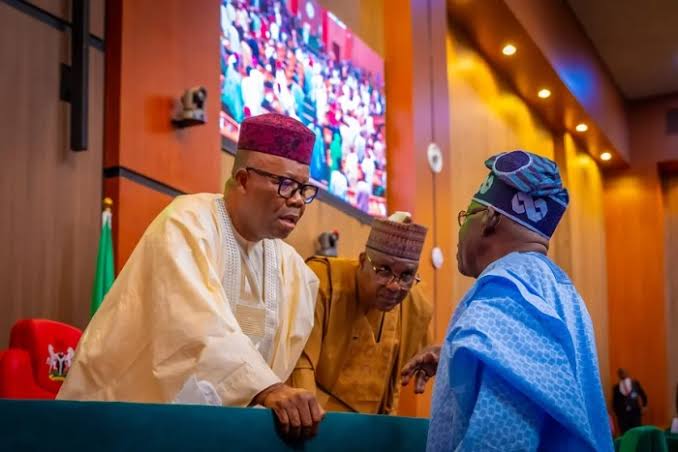Akpabio Tells Tinubu: ‘Ministers Who Disregard National Assembly Invitations Are Undemocratic and Don’t Belong in Your Government
Senate President Godswill Akpabio has raised serious concerns about the conduct of certain ministers in President Bola Tinubu’s administration, urging the President to take decisive action against those who act undemocratically by refusing to honor invitations from the National Assembly.
Akpabio described these ministers as “intransigent” and emphasized that such behavior is not only a breach of the constitution but also a direct hindrance to the legislative process.
During the presentation of the 2025 budget proposal to a joint session of the National Assembly in Abuja, Akpabio made a strong plea to Tinubu, stressing that ministers who deliberately ignore the National Assembly’s invitations undermine the democratic principles upon which the government is built. He pointed out that this kind of conduct goes against the spirit of cooperation between the executive and legislative arms of government and severely limits the ability of lawmakers to perform their constitutional duties effectively.
“It is clear that those who refuse to honor invitations from the National Assembly are not operating within the democratic framework of this country,” Akpabio said. “They should not have a place in your government because their actions directly undermine the principles of accountability and transparency that we hold dear in our democracy. The National Assembly must be able to carry out its role in scrutinizing government activities, and we cannot allow any minister to obstruct that process.”
Akpabio’s comments come amidst growing frustration within the National Assembly about the lack of cooperation from some members of the executive. His statement reflects the ongoing tension between the legislative and executive branches of government, with lawmakers seeking to assert their constitutional role in overseeing the actions of the government.
In a related development, President Tinubu took the opportunity to reiterate his administration’s commitment to the ongoing economic reforms, acknowledging the significant challenges faced by Nigerians due to the adjustments. The President made it clear, however, that the journey of economic transformation, though difficult, was essential for the long-term prosperity of the country.
During his speech to the joint session, Tinubu emphasized that while the reforms may be painful in the short term, they are a necessary sacrifice for Nigeria’s future success. He urged the Nigerian people to remain patient and continue to support the reform agenda, assuring them that there would be light at the end of the tunnel. “This path we have chosen has not been an easy one, but it is one that must be followed if we are to unlock the true potential of Nigeria,” the President said. “We are confident that these reforms will ultimately lead to a stronger, more prosperous Nigeria.”
Tinubu’s remarks underscore his determination to press ahead with the economic agenda despite widespread dissatisfaction with the current economic conditions. The President’s steadfast approach aligns with his administration’s broader vision of creating a more sustainable and competitive economy for the country.
Together, these developments highlight the delicate balance between the executive and legislative branches, and the challenges faced by President Tinubu’s government in implementing its reform agenda while maintaining a functioning and cooperative relationship with the National Assembly.






